The Shivah had an awesomely rabbinical take on Monkey Island's insult sword-fighting
We're rerunning Richard Cobbett's classic Crapshoot column, in which he rolled the dice and took a chance on obscure games—both good and bad.
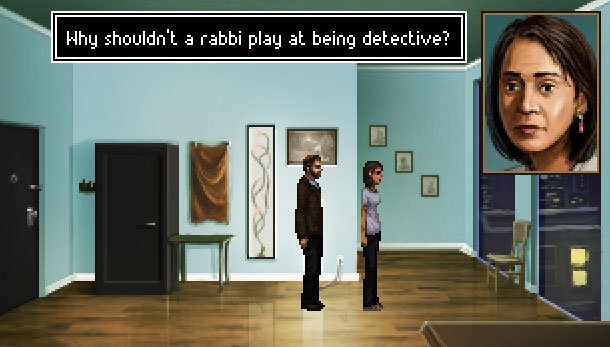
From 2010 to 2014 Richard Cobbett wrote Crapshoot, a column about rolling the dice to bring random games back into the light. This week, let's talk about one that's finally getting its due—a smart game that launched a thousand adventures. Well, a dozen and change. But that's not bad going!
There's a lot to like about The Shivah, but what's most impressive about it is what it isn't. It's about a preacher, but it's not preachy. It's a moral story, but it doesn't moralise. It's got soul, but it's not a soldier. It's a rare case of a game that dares to handle religious themes, but without heading down the path trod by previous Crapshot games like Captain Bible, Bibleman, and The You Testament, or completely negating them with extra layers of fiction, like just about everything involving the Knights Templar over the years. There are no aliens here. There's no lost treasure. There's simply a man, who happens to be a Rabbi, whose faith and crisis of same are equally relatable whether you share it, follow a different religion, don't believe in any of that stuff, or even claim lifelong allegiance to the Flying Spaghetti Monster.
Oh, and it's got a really clever twist on Monkey Island's insult sword-fighting too.
To be exact, this is The Shivah: Kosher Edition, which is simply "Shivah" in the game itself (I've never been entirely sure whether the 'the' is part of the name). It's the same game though, jazzed-up from an original that rocked the finest art Microsoft Paint could provide, with much-improved backgrounds and characters. Other versions available include simply Shiva, in which hero Rabbi Stone is replaced with the naked blue lady from Final Fantasy and the entire game consists of finding the villain and pelting him with ice magic (sounds short, but given the length of Final Fantasy cutscenes, still longer than the entire Deponia series) and the inevitable pirated version, Shivah Me Timbers.
Right. Mandatory puns now over.
Unlike the bible-themed games above, this isn't really a religious game; it's simply a game about a religious man. Or at least, a formerly religious man struggling to figure out where he stands. As we meet him, Rabbi Stone is in charge of a poor, failing synagogue in New York city with an audience of two, and an internal monologue that suggests Philip Marlowe could have easily have rocked a yarmulke.
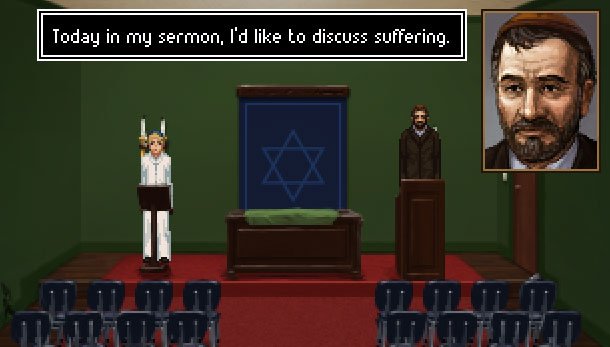
"The night sky above Manhattan will never win any awards," he sighs. "The few stars visible looked lonely and desperate. I could relate."
Keep up to date with the most important stories and the best deals, as picked by the PC Gamer team.
Part of what makes The Shivah effective is that it's willing to embrace its main character as both flawed and human. The very first scene is him cutting his sermon off mid-flow and locking himself away in his office. The next, a policeman appears to say that a former member of his congregation, Jack Lauder, has been murdered, and Stone's response, even factoring in natural care at dealing with a cop, is little more than "Oh." It's only the news that the deceased has suspiciously left him over $10,000 for no apparent reason that stimulates Stone's giving-a-crap gland, reminding him of simpler times, and also promising... well... $10,000. That buys a lot of curiosity.
The only catch? "It was blood money. And I couldn't believe God would work that way."
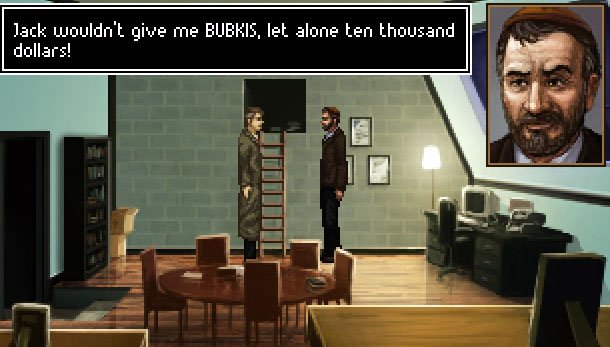
The titular Shivah—a mourning period for the dead (which doesn't actually take place here, as Lauder's wife isn't Jewish, though she does follow a few of the traditions)—is Stone's convenient 'in'. Not for carrying out religious duty, but for playing detective and figuring out what's going on. It's a clever solution to the classic mystery problem; if you've got a character other than a cop or a PI or similar, what's their reason for getting involved and why does nobody just tell them to stick their head in a pig after the 50th personal question.
Here, Stone has a direct reason for wanting to know the truth, gets to claim religious observance, and can point to kosher law when his subjects start getting that '49 and counting' look in their eyes. It's a neat little set-up for a mystery, both bending the rules for the sake of pragmatism, and having that mirrored in a hero who already worries he's drifting away from them. This might not seem like a big deal, narratively speaking. Given the number of kleptomaniac sociopaths calling themselves adventure game heroes out there though, it's a very rare case of self-awareness.
There's also an interesting comparison when he speaks with Lauder's wife that despite generally looking back on his more devout years as simpler, better times, he still feels guilt over specifics—not least having forced Lauder out of his congregation for marrying outside the faith. As an older man, one who favours answering questions with questions wherever possible, he can only reply "Were you and Jack happy? Then my reasons don't matter." Later, he both vehemently defends his choice in the face of accusations that he never learned to compromise, and accepts that on a human level, it still hurt him. The Shivah never picks a side, limiting itself to simply that this is what happened and these are how the chips fell.
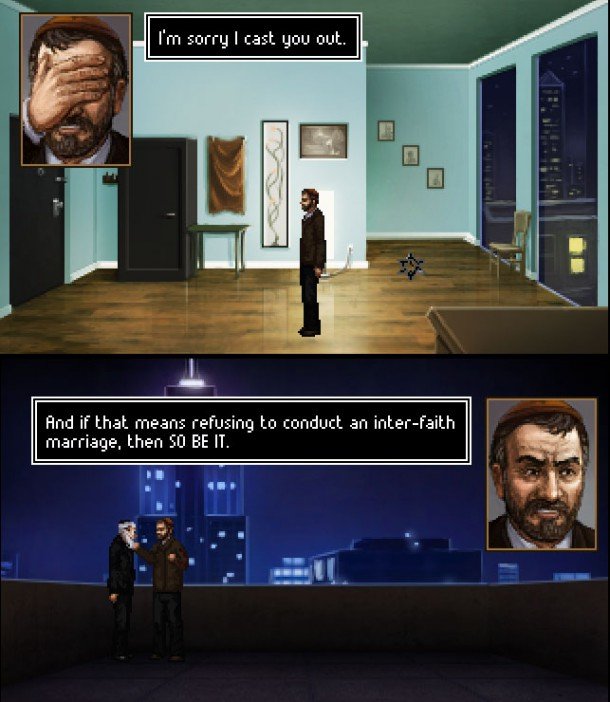
In a lesser game, Stone ultimately sitting on the fence could have felt like a cop-out. Here, it's simply part of the tapestry; a self-doubt that everyone can at least understand and empathise with, whether they stand on one side of that specific line or have no cultural connection to it whatsoever. Stone is no more intended to represent all rabbis than Guybrush Threepwood speaks for all pirates —he's simply a man, fallible as any, presented warts and all for the player to draw their own judgements and conclusions.
Wider afield, this is arguably the first moment in Dave Gilbert's adventures that demonstrate his knack for minimalistic writing that would well serve the series that The Shivah's success spawned: The Blackwell Legacy. It's used to great effect in a number of cases, including the horrible fate of the main character's aunt and the unspoken threat of her failing at her duties, as well as specifically in the way that every player of the series seems sure they know the backstory of main character Rosa's ghostly sidekick Joey, despite having completely different theories on what it actually is and only the tiniest scraps ever having been revealed. Was he a mobster? Lounge singer? Guy on his way to a costume party?
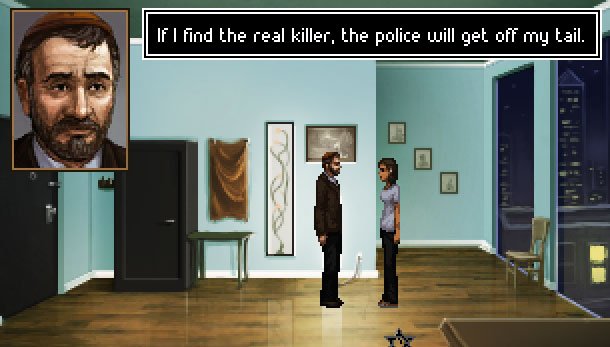
But back to the murder mystery, already in progress. Stone discovers that between the unpleasantness and Lauder's unusual generosity, he began visiting another temple—Beth Tikvah—run by an elderly rabbi called Zelig. The two immediately begin fighting a fantastic verbal battle of 'rabbinical answers', answering questions with questions, in a way that annoys the crap out of most people that Stone tries it on. Here, he's outmatched in a straight-up battle that goes a little something like this:
"What brings you to our humble synagogue?"
"Do you know Mr. Jack Lauder?"
"Should I know Mr. Jack Lauder?"
"Don't you think you SHOULD know Jack Lauder?"
"Why do you think so?"
"Wasn't he a member of your congregation?"
"Was he?"
"Don't you know your own congregation?"
"Am I expected to know everybody?"
"Well..."
And then for some reason this doesn't happen:
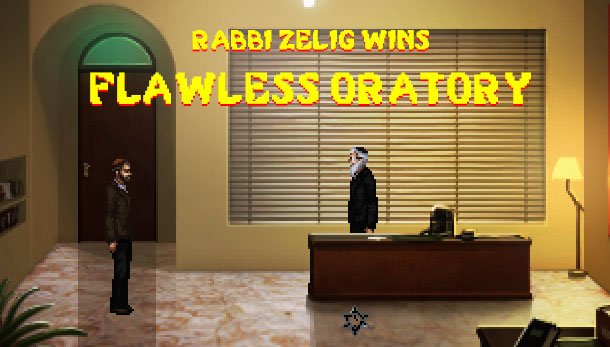
...but clearly should. Still, with a little poking around, Stone discovers reason to be suspicious of his rather more successful counterpart. It's obvious that whatever happened to Lauder, it involved a tough called Joe and a partner, Ethan Goldberg, neither of whom Zelig wants to discuss until absolutely backed into a corner. And even then, only to point out that people getting up to things in his temple should cast no aspersions on the place itself. He makes this very clear. One might even say, with a few veiled and carefully unspoken threats. Because he's totally the villain. But sssh! Spoilers!
Luckily, he's not a very skilled villain, using the computer login name 'rabbiz' and the name of his pet dog as a password. Idiot. This makes it very easy for Stone to find reasons to hate him, not least that his inbox is like the Star Trek Mirror Universe version of his own. Stone's email? All "Rabbi, your talk was very depressing," and "My children are scared of you." Zelig's? "You're so inspiring." "I just wanted to congratulate you on another hair raising sermon." He even has a better spam filter than Stone, stripping out unsolicited e-mails from some company called "Wadjet Eye Games" that makes obscure point-and-click things from some dead genre in the '90s. Truly, Stone has found his arch-nemesis.
Oh, and he's also revealed to be in the business of setting up his congregation with Mafia loan sharks and stuff. So, that's a pretty good reason to hate him too, obviously. Not as good, obviously, but...
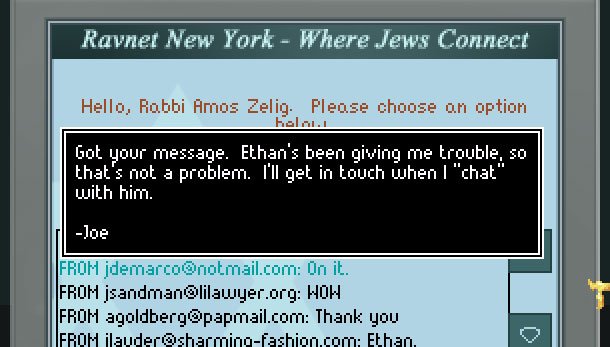
Sadly for Stone, Zelig may be bad at passwords, but he's not quite bad enough at evil to actually write a full confession. That means tracking down Joe in the city of New York—one Italian guy in a population of close to nine million. Impossible? Hah! Not in a short adventure game! It takes about three seconds, thanks to him hanging out in one Irish pub that's home to exactly nobody save an oddly familiar redhead and a Sectoid from XCOM: Enemy Unknown behind the bar for some reason.
This is why adventure game map screens are way more convenient than real maps.
Joe the Heavy is not exactly the smartest cookie, with his idea of deflection being the likes of "Are you Jewish, Mr. DeMarco?" "What's Jewish?". Stone of course takes this in stride, slowly picking away at his declarations that he's never met Jack, Ethan, or Zelig, before finally deciding he's had enough of this shit and that the only rolling this Stone is going to do is straight over some two-bit punk.
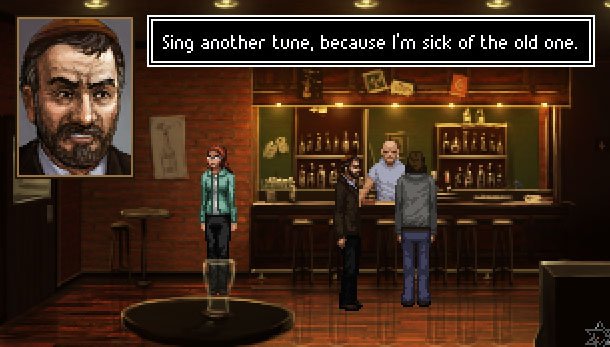
Joe, not exactly shaken by being shaken down by a rabbi of all people, is less than intimidated, but promises that sure, he'll talk. Outside. Or, y'know, in a subway station. An abandoned subway station. With no people in it. In the middle of the night. In a seedy part of New York. Right next to a dive bar.
This goes about as well as you'd expect, really.
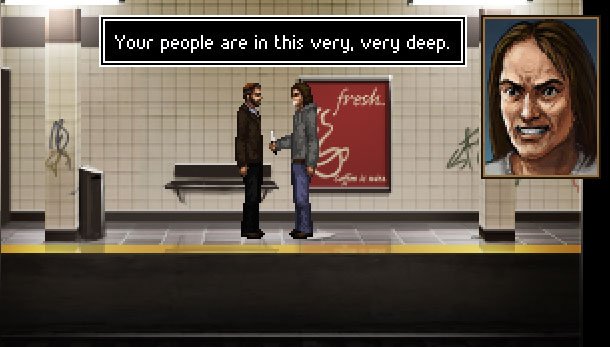
"You've pissed off the wrong people, rabbi," Joe informs Stone, pulling a knife. "I had no problem with you. But now I've got to kill you." And of course, he tries. Stone however uses his years of experience to turn the tide in his direction, hitting Joe with question after question to lower his defences. "How can you live with yourself?" "Why are you so angry?" "Are you hiding from someone?" You know the drill.
Faced with this calmness, Joe is thrown—not to the point where he has any plans to let Stone go, but allowing himself to be talked into disarming himself instead of fighting like a coward against the defenceless holy man. "I don't need a knife to take your sorry ass," he spits, laughing at the sight of Stone quietly raising his fists. "You think your God's going to help you out of this?"
"Perhaps... perhaps not..." considers Stone, dropping the questions in favour of delivering the beat-down of Joe's life with his bare fists and dangling his carcass over the platform edge in front of a train. "But my four years on the B'nai Brith Yesheva High School Boxing Team will even the odds!"
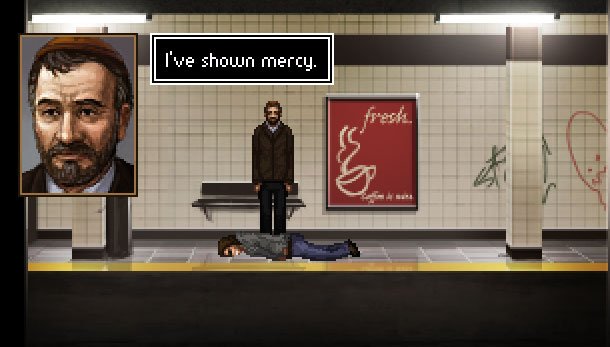
Even with Joe's inevitable hasty confession, Stone doesn't quite have the leverage over Zelig that he needs—mostly because he just leaves Joe in a pile on the platform rather than frogmarching him down to the nearest police station to give a full account of himself on pain of Stone's shoes turning his little Italian sausage into pate. Zelig helps out though, kidnapping Lauder's wife for honestly no particularly good reason save to keep things humming along, and leaving his home address in a note for Stone.
Ah, what a nice villain. Admittedly, not a particularly smart villain, unless the New York police are so incompetent as to be confused by what's basically a written confession leading to a bound and gagged woman in a sinister-looking rabbi's apartment. Especially since Zelig himself admits that his only reason is that Joe didn't check in, which quite possibly means that he's just completely incriminated himself because Joe got drunk or hit by a car or something. Oh, and that if Stone hasn't already gone to the cops, he obviously has nothing that will stick. This approach to villainy is slightly less genre-savvy than trying to headbutt Jason Vorhees is what I'm saying. Still, at least it's efficient, getting Stone to his house a whole 10 minutes faster than if he'd had to, say, Google the address.
That sound you hear is all Zelig's time at villainy school getting pissed straight down a wall. Or possibly his kidnap victim alerting the cops with a sample of why her nickname is "Scream" Lauder.
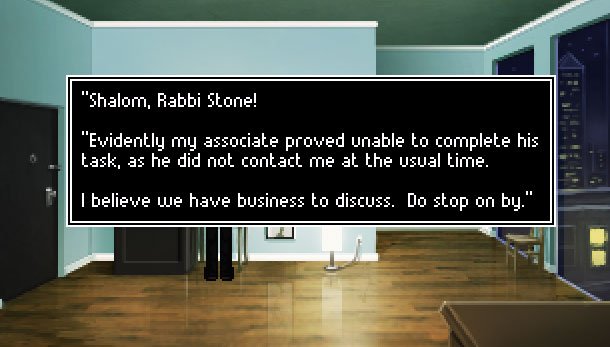
On the other hand, while Stone has common sense and righteousness on his side, Zelig has 'a gun'. That evens things up a little bit. Possibly more than a little, especially when his plan is to use it to make Stone walk to his apartment balcony and jump right off. The evil genius! Truly, the only flaw with this plan is that... uh... it will draw the attention of the police right to his house, where the mysterious death of a murder suspect will inevitably be combined with the long trail of evidence Zelig has incompetently left behind, at the very least putting him in danger and quite possibly exposing his entire scheme. Also, his leverage for this is promising not to kill Lauder's wife, despite clearly not being able to leave her alive after hearing his villain speech, which means Stone has no reason not risk going for the gun and snapping the much weaker man like a twig without even needing his trusty boxing gloves, Sodom and Gomorrah.
Now I think about it, Zelig really sucks at this, doesn't he? He gets his villain card clipped further when Joe storms in, his previous ass-whooping having apparently sunk in. "Did anyone follow you?" Zelig demands, having forgotten that he himself practically left his business card at a crime scene. Then, when Joe angrily insists that he wants his money, he completely breaks villain protocol by replying "You want what you deserve? Fine!" and shooting him. No! Foul! The idiot minion has to say that.
Two strikes, Zelig. One more, and you're never going to get a spin-off about your start of darkness...
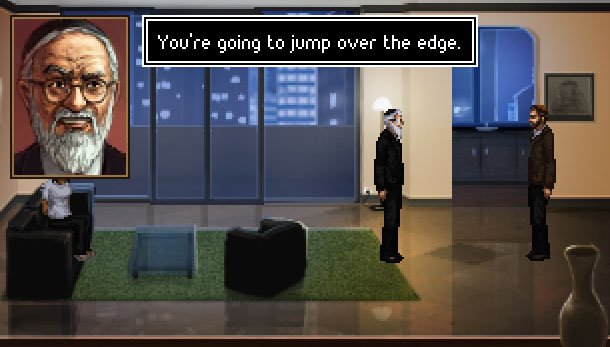
Zelig continues to embarrass villainy when, having shot Joe, he finally gets Stone out onto his balcony to force him to make his fateful jump. Stone doesn't, obviously, because that would be very mean to the hardworking New York street cleaners.
Instead, he goes for Zelig's gun, and gets shot in the arm. Then he goes for Zelig's gun again... and gets shot in the other arm. Zelig doesn't appear to spot what we might refer to as 'a bit of a pattern here', even with Stone now close enough to plant a kiss on his forehead and not apparently that bothered by what should have crippled both arms. He's not quite stupid enough to allow a third round of that silliness... but when Stone simply swings out onto the balcony and starts admiring the view, he is stupid enough to start sighing and agreeing "Yes. It is nice, isn't it?"
And is then surprised when Stone rips the gun out of his hand and throws it off the balcony, hopefully not killing some poor passer-by who Rosangela Blackwell will have to spend the rest of the night convincing of their new post-mortem status. Oh, Zelig. Idiot, idiot, idiot. Go stand on the naughty step!
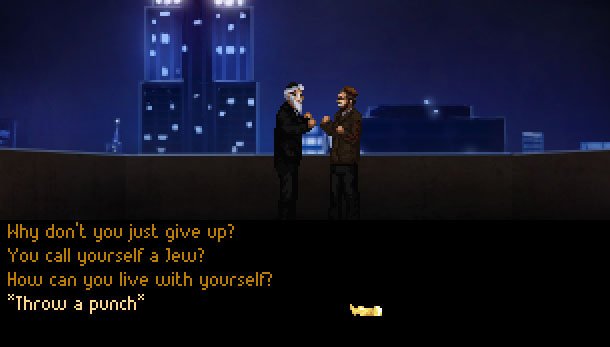
But! I promised an awesome take on Monkey Island's insult sword-fighting, and here it is. Two rabbis facing off, high in the Manhatten skyline. How do you think they'd fight? With fists, obviously. And indeed, they do. Anything else would be silly. However! What actually opens up opportunities for a punch is waging war with questions. Going a couple of rounds without scoring means taking a hit. Knocking Zelig off balance by forcing him to give a straight answer of his own means scoring one on his wrinkled carcass and pushing him closer and closer to the business end of the balcony edge himself. For example:
"You really call yourself a Jew?"
"You really call yourself a hero?"
Ooof! No opening there.
"Last chance. Do you want to give up?"
"No. Do you want to DIE?"
Eh. Partial credit, Zelig. Bit theatrical. Next?
"How can you live with yourself?"
"With power, respect and money."
Beep! Sorry. One punch in the face for you! And then another punch in the face! And so on, until Zelig is either over the balcony or out for the count, leaving just one anonymous tip to the police to make, and about $10,000 of no-longer-tainted blood money to spend. So, that was a good night's work.
Does it make him any happier though? Have his adventures helped him find his faith again? Oddly, no, not really. If he's come to a revelation, it's much more grounded than the usual Eureka moment.
"God might not seem fair," he begins his sermon, more confidently picking up on a theme that at the start of the game led him to simply walking off mid-flow. "We may not always feel connected to Him. That is, we may feel lonely, and often do. Yet the underlying reality of our lives is that we are ALWAYS connected, whether we feel it or not. Whether we accept or deny it, the connection is there. And since we are connected, we are responsible. Battling for goodness is how we give our lives meaning. Maybe there are no answers. Ultimately, we may never find that elusive truth. Yet ultimately, we may find something else: meaning, significance, and fulfilment. If so, that may be enough."
But in the safety of his head, he still has to add to himself: "Dear God, I hope that's enough."
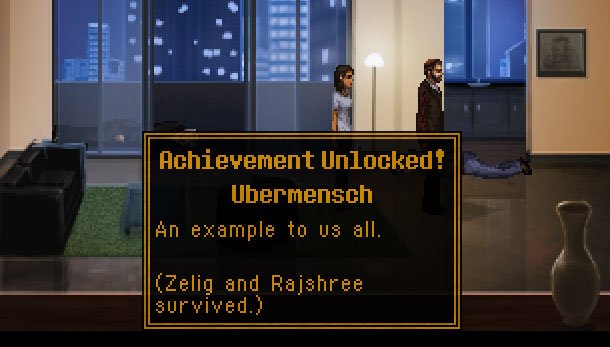
While the Kosher Edition of The Shivah polished up the graphics, it's the same base game that it always was: a short adventure to be sure, whose simplicity doesn't do a whole lot for the villain's credibility, but a wonderfully tight one. It does a lot with a little, while simultaneously being smart enough not to try and reach. It's a murder mystery, which gets to dip its toe into a couple of controversial subjects without actually getting swallowed up by them, but still getting deep enough that its religious trappings become part of the game's fabric rather than just the scenery.
The rabbinical fighting is the most obvious part there, but it also fleshes out Stone and gives him a purpose in a story that otherwise, honestly, he has no need to be in. A few early threats of the police swooping in can't cover up the fact that he has no motive nor reason to be suspected of Jack's death, and the money he receives at the end of the game would have arrived whether or not he'd pulled his best gumshoes on or simply sat and brooded.
Likewise, the fact that neither the cash nor the murder doesn't in itself teach him a lesson feels important; The Shivah is a journey that Stone sets himself on because he needs one, and his revelation merely the first step back on the path rather than anything searing. It's notable for instance that his congregation is still empty afterwards, and his approach entirely fatalistic. The debts will keep coming in. For now, much like his spiritual crisis, he has what he needs to cope. At some point though, he's going to need something more permanent to really keep both himself and his temple going. Will he find either? Not for us to know. And that's in the good ending. There's another, where his approach to problems is rather less merciful.
If you're curious about that, or to see the rest of the game in more detail, check out The Shivah: Kosher Edition. Of Wadjet Eye's other games, I highly recommend Unavowed and the Blackwell series, which starts out neat but super-janky in The Blackwell Legacy but quickly becomes excellent. As with Shivah, whether or not there should be a "The" on some of the episodes remains a mite enigmatic.

